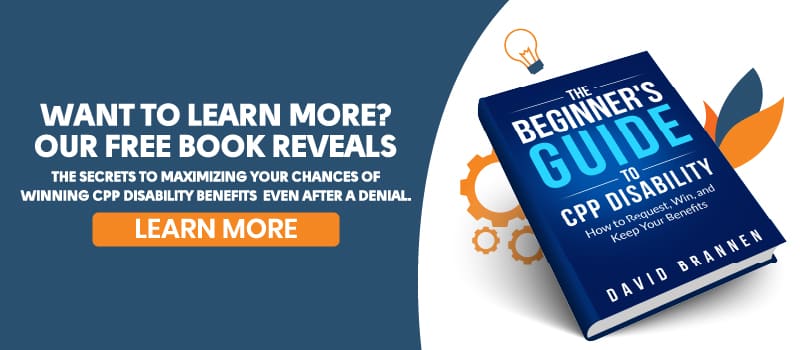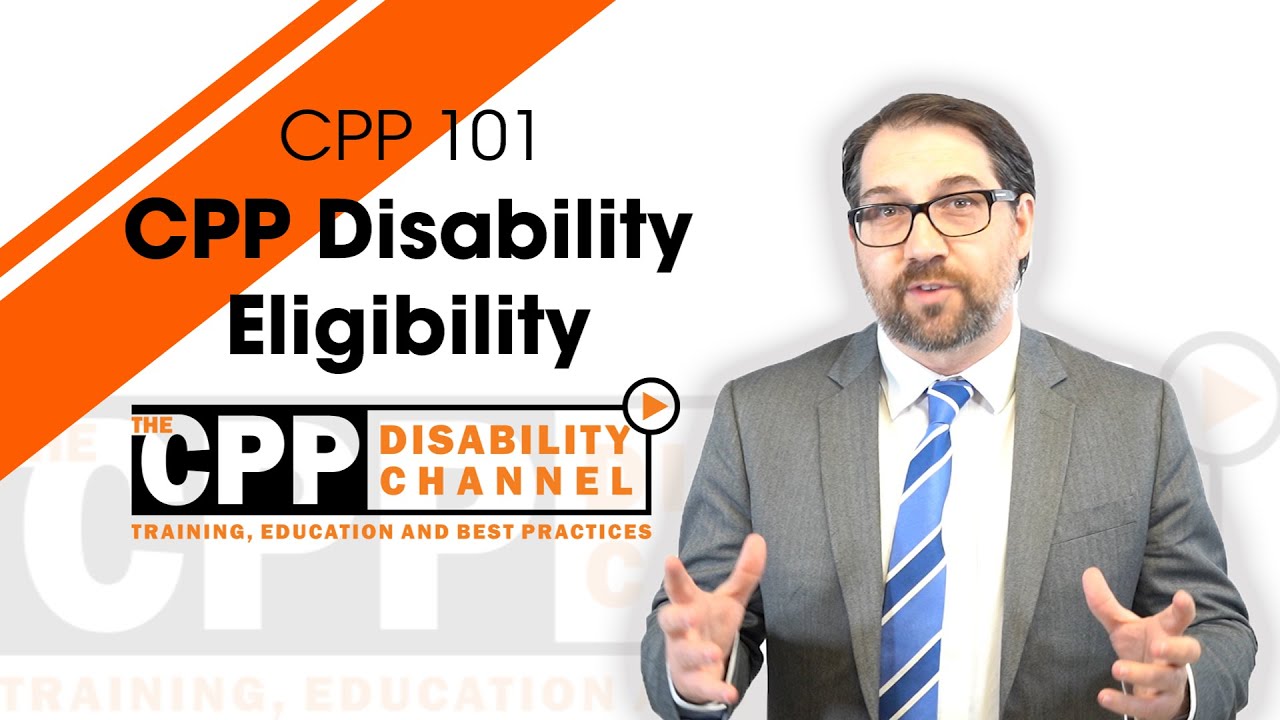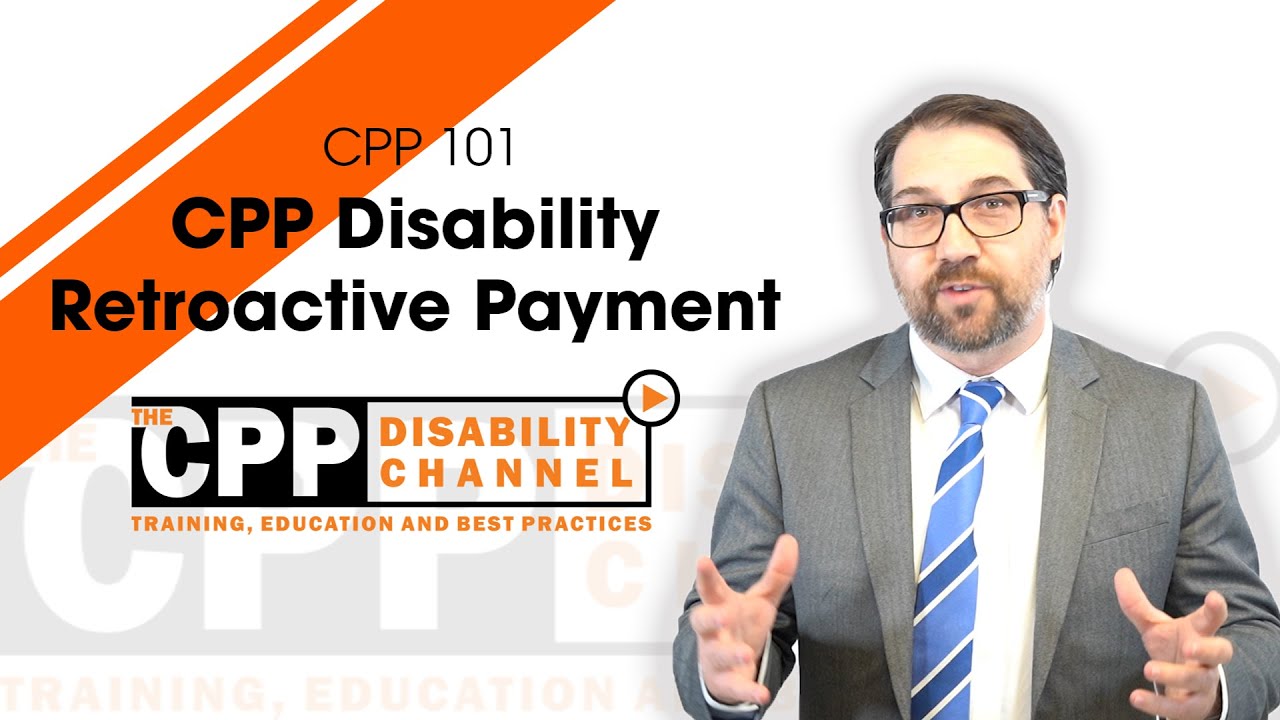CPP disability is an income replacement benefit program run by Service Canada. It pays monthly benefits to eligible people. To qualify, you must meet age, contribution, and disability requirements. I wrote this guide to explain how CPP disability works.
With this information, you can figure out if you qualify for benefits and learn what steps you should take next.
What is CPP disability?
Canda Pension Plan disability is an income replacement benefit program. It is administered by Service Canada and pays disability benefits to eligible people. To qualify for CPP Disability, you must meet age, contribution, and disability requirements. You apply by sending an application to Service Canada. Then, they review your claim and either approve or deny it. If approved, you get a monthly payment. These payments can go to age 65.
Benefits of applying to Canada Pension Plan disability benefit
Applying for and ultimately getting approved for CPP disability can provide several benefits for people with disabilities. Here are a few key benefits of submitting a successful CPP disability application:
- Financial support: People who cannot work due to disability have fewer opportunities to earn income. Thus, CPP disability is a great way to help pay for basic living expenses such as food, housing and utilities.
- Access to healthcare benefits: In certain provinces and territories, being on CPP disability provides you with access to certain healthcare benefits and programs. These programs often help offset or reduce the costs associated with medical expenses.
- Financial independence: People with disabilities are often forced to rely on others — such as spouses, caregivers or family members for financial support. While this help is appreciated and often needed, it can create an imbalance of power in relationships. So, having access to a benefit like CPP disability allows people with disabilities to provide for themselves and be financially independent.
- Retroactive payments: Another key benefit associated with receiving CPP disability is depending on the onset date of your disability, you may be paid retroactively. For instance, suppose CPP determines you are eligible for retroactive payments. In that case, you will receive a lump sum payment for the months between your application submission and the date at which you became eligible. Back pay can cover up to 12 months, so in many cases, you can receive a significant amount of money from these retroactive payments.
- Tax advantages: Depending on your situation, getting approved for CPP disability could make you eligible for certain tax benefits, such as the Disability Tax Credit (DTC) and the Canada Workers Benefit (CWB).
- Rehabilitation Support: CPP Disability offers a robust vocational rehabilitation program aimed at helping people who may be ready to return to work. This program allows you to receive your full CPP disability payment while you participate and, in some cases, will even pay for you to upgrade your education or retrain to secure a job. It also provides access to counsellors and vocational rehabilitation specialists.
- Survivor Benefits: If you die while receiving CPP disability benefits, your eligible survivors, such as your spouse or common-law partner, may be entitled to survivor benefits. These benefits can provide peace of mind for you and your family.
CPP disability benefits
At this point, you may be wondering how does CPP disability work? Well, the CPP disability benefit is a monthly payment from Service Canada. There are two types of payments: The first kind of payment is the regular CPP Disability benefit. It is the most common. The payments fall between $583.32 and $1,673.24 per month in 2025. The amount depends on how much you paid into the Canada Pension Plan. Additionally, the payments go up each year at the rate of inflation.
The second is the post-retirement benefit. However, this benefit is only for those aged 60 and over who already receive the CPP retirement benefit.
| Benefit Name | Age | Requirements | Payment ranges (2025) |
|---|---|---|---|
| CPP Disability Benefit | Under age 65 | Not getting the CPP Retirement Pension | $583.32 – $1,673.24 |
| CPP Disability Post Retirement Benefit | Age 60 to 65 | Already getting the CPP retirement pension. Or became disabled after starting the CPP retirement pension | $583.32 (fixed amount) |
The CPP disability children’s benefit
The CPP disability children’s benefit is also a monthly payment. Service Canada pays it to the children of people approved for CPP disability. However, eligibility is still based on the parent’s disability. If approved, each child gets $294.12-$301.77 per month in 2025. This benefit is paid to the child’s primary caregiver. If they are between 18 and 25 and enrolled in school, then the child may receive the payment.
CPP disability eligibility criteria
Not everyone is eligible for benefits. So, we will review the requirements for each benefit below. We included criteria for the regular CPP disability benefits. We also share eligibility for the post-retirement benefit and the children’s benefit.
There are four main requirements for Canada Pension Plan disability eligibility: age, contributions, severe disability, and prolonged disability.
Age
The age requirement is very simple. So, for regular CPP disability, you must be under the age of 65. For the post-retirement benefit, you must be aged 60 to 65. And finally, for the children’s benefit, the child must be under the age of 18 or between 18 and 25 and enrolled in school.
Contributions
On the other hand, the contribution requirement is more difficult to understand. It’s not enough to have paid into the Canada Pension Plan. Your disability onset date must also be when you made recent payments to the CPP. You must have paid in 4 of the last six years. Alternatively, if you have 25 years or more of contributions, you must have paid for 3 of the last five years. This is called the minimum qualifying period.
Severe disability
Severe disability has a very specific meaning. That is to say, you have a mental or physical disability that stops you from doing substantially gainful work. In other words, the focus is on your ability to work. Your personal characteristics, like age, education, and work experience, are all taken into account. The ultimate question your insurance company wants to answer is whether you are employable. That is, in the “real world,” not just on paper.
For more information on substantially gainful work, check out our article: how much can I earn while on CPP disability?
Prolonged disability
Prolonged disability also has a specific definition. It means that your disability must be long and of indefinite duration or be likely to result in death. So, a severe disability (that isn’t prolonged) will not qualify.
Additional requirements for the Post-Retirement Benefit
As the name suggests, this is only for people receiving the CPP retirement benefit. And you can only get it if you have been getting retirement payments for more than 15 months. If it has been less than 15 months, you can ‘convert the CPP retirement pension to the CPP disability benefit.’ You should always do this if you can because getting the regular disability benefit will raise your retirement payment at age 65.
Additional requirements for the Children’s Benefit
The children’s benefit is based on the parent’s disability. When a parent is approved for CPP disability, their children may also get benefits. However, the child must be under the age of 18 or between 18-25 and enrolled in school.
How much is CPP disability? (2025)
How much does CPP disability pay? In order to calculate your payment, Service Canada uses ‘the CPP disability benefit formula,’ which is basically a CPP disability calculator. So, your payment is a flat amount — of $583.32. You also receive an amount based on how much you contributed. Service Canada estimates your total benefit. You can see this in your My Service Canada Account (MSCA).
CPP disability payments 2025 table
| Benefit | Avg Monthly CPP disability amount (Oct. 2023) | Monthly CPP max 2025 |
|---|---|---|
| Regular CPP disability benefit | $1,538.67 | $1,673.24 |
| CPP disability post-retirement benefit | $583.32 | $598.49 |
| CPP disability children’s benefit | $294.12 (per child) | $301.77 (per child) |
You may wonder if the CPP disability benefits are retroactive. In other words, will Service Canada pay you for the past months? The answer is yes. But there are limits. For instance, your back pay is a maximum of 12 months before your application date. It also includes the months from your application date to your approval date.
Learn more: CPP disability retroactive payment
CPP disability drug benefits
Many people erroneously believe that CPP disability offers a drug plan or will pay for medical expenses associated with having a disability. This is false. CPP is an income replacement benefit. Therefore, it only pays income benefits and children’s benefits.
If you’re interested in learning more about the medical expenses you can claim on your tax return, check out the government of Canada’s page on tax credits and deductions for persons with disabilities. You may also be eligible for the Disability Tax Credit, which is a non-refundable tax credit that helps people with impairments reduce the amount of income tax they may have to pay.
CPP disability dental coverage
CPP Disability does not offer dental benefits or coverage. However, the Canadian Dental Care Plan will become available to uninsured Canadians under 18, persons with disabilities, and seniors with an annual family income of less than $90,000 by the end of 2023.
CPP disability payment dates 2025
Service Canada pays benefits once per month. Following are the CPP payment dates for 2025:
- January 29, 2025
- February 26, 2025
- March 27, 2025
- April 28, 2025
- May 28, 2025
- June 26, 2025
- July 29, 2025
- August 27, 2025
- September 25, 2025
- October 29, 2025
- November 26, 2025
- December 22, 2025
Do you want a deep dive into CPP disability payments? Check out our interview with ‘CPP pension expert,’ Doug Runchey.
Being approved for CPP disability is great news. But, it can come with a new set of challenges. Below, we discuss the common problems you may face.
Getting payments started
Keep in mind payments don’t start right away. Rather, it can take anywhere from one to five months to get your first payment. You can check the status online at My Service Canada. But give them two months. Then, start calling to see what is going on. If you feel like they aren’t taking you seriously, then you can file a complaint.
Read More: How to File a Complaint against Service Canada for CPP Disability.
Overpayments
CPP disability overpayments cause a lot of stress. Overpayments happen when you get paid CPP disability and another disability benefit in the same month. The most common is long-term disability benefits. When this happens, the insurance company can decrease what they pay you. If they already paid you in the past, then you have to pay them back.
Learn more: CPP Retroactive Payment and Long-term Disability Overpayment.
Tax problems
CPP disability benefits are taxable as income. This can be a problem when you get a large retroactive payment. You have to pay tax on this payment — even if it is paid to your insurance company.
Read more: Paying Taxes on CPP Disability: Your Top Questions Answered
Need help with CPP disability payments?
CPP disability is designed for people to apply on their own. Or with help from a friend or family member. However, sometimes it is hard to win on your own. Even if you are legitimately disabled and should qualify, it can be very frustrating. In difficult cases, it is common for people to work with a representative. This can be a CPP disability lawyer or another person who is experienced with the process (i.e., a CPP Disability Navigator). Many representatives will work on a no-win, no-fee basis. Do your research before hiring any lawyer or advocate.
At Resolute Legal, we have successfully represented CPP disability clients in every province in Canada. Our CPP disability lawyers help you at all stages of the claim, including the initial application, reconsideration appeals and the Social Security Tribunal. If you’re dealing with an appeal, we can review your situation and offer suggestions to improve your chances of success. This is part of our free claim review. Call us toll-free today at (888) 480-9050 or fill out a form to request a free consultation.
CPP disability benefit resources
Service Canada has designated offices for CPP disability. You must send all correspondence to your designated office.
Offices by province and territory
| Province | Address |
|---|---|
| Newfoundland and Labrador | Service Canada, PO Box 9430 Station A, St. John’s, NL A1A 2Y5 |
| Nova Scotia and Prince Edward Island | Service Canada, PO Box 9430 Station A, St. John’s, NL A1A 2Y5 |
| New Brunswick and Quebec | Service Canada, PO Box 250, Fredericton, NB E3B 4Z6 |
| Ontario | Service Canada, PO Box 2020 Station Main, Chatham, ON N7M 6B2 |
| Manitoba and Saskatchewan | Service Canada, PO Box 818 Station Main, Winnipeg, MB R3C 2N4 |
| Alberta, Northwest Territories and Nunavut | Service Canada, PO Box 2710 Station Main, Edmonton, AB T5J 2G4 |
| British Columbia and Yukon | Service Canada, PO box 1177 Station CSC Victoria, BC V8W 2V2 |
The phone number for Service Canada is 1-800-277-9914. This is the same number for all provinces.
CPP disability forms
The following is a list of all CPP disability forms.
Service Canada
- CPP Benefits Application
- Medical Report for CPP Disability Benefit
- Terminal Illness Application for CPP Disability Benefits
- Terminal Illness Medical Attestation for CPP Disability Benefit
- Consent to Communicate Information to an Authorized Person
- How to Certify Copies of Documents
- Certificate of Incapability
- Request for Voluntary Federal Income Tax Deduction
Social Security Tribunal
- Notice of Appeal (General Division)
- Application to the Appeal Division for Leave to Appeal
- Appointment of a Representative and Authorization to Disclose
The CPP Disability Channel
To learn more about CPP, check out ‘the CPP Disability Channel’ on YouTube. We produce this channel and post one to two new videos per week. So, make sure to check it out.
FAQs
How long does it take to get approved for CPP disability?
Typically, it will take about four months to get a decision on your CPP disability application. However, if your condition is “grave,” you’ll likely hear back in under 30 calendar days. And if your condition is found to be terminal, CPP aims to process your application within five business days.
How long does CPP disability last?
CPP disability benefits continue until you either no longer meet the program’s eligibility criteria or until you reach age 65, at which point they cease due to the commencement of the Canada Pension Plan retirement pension.
How long can you collect CPP disability?
CPP disability benefits are not a lifelong entitlement. They are accessible as long as you satisfy the disability criteria or until you reach 65, at which point CPP retirement benefits commence. It’s essential to understand that eligibility hinges on maintaining your disability status or reaching the retirement age threshold.
How long can you pay into CPP?
To receive the maximum CPP disability payment, you must contribute to the program for at least 39 of the 47 years from ages 18 to 65. You must also contribute the maximum amount for at least 39 years. This maximum amount is based on the yearly annual pensionable earnings (YMPE).
The YMPE is $71,300 in 2025.
What other benefits can I get while on CPP disability?
While receiving CPP disability benefits, you may be eligible for a few other disability benefits, some of which include long-term disability insurance benefits, the Disability Tax Credit, provincial disability benefits (ODSP, AISH, DSP, etc.), and, depending on what province you live in, workers’ compensation.
Keep in mind, however, that many of the aforementioned programs will offset the amount you receive from CPP disability by the amount they are paying you. For instance, many long-term disability insurance policies have clauses that will allow them to do this. So, if you were receiving $1,000 from CPP disability, your long-term disability insurer could reduce your disability insurance payments by $1,000.
How much is the CPP disability increase in 2025?
What was the CPP disability payment increase in 2025? In January of 2025, the maximum monthly CPP disability payment amount reached $1,673.24. This monthly maximum continues to grow incrementally thanks to the CPP enhancement introduced in 2019. Starting from $1,673.24 in January, it is expected to climb to $1,685.61 by December.
Free CPP disability book
Want to learn the secrets to winning CPP disability benefits? If so, click on the image below to download a free copy of our book: ‘The Beginner’s Guide to CPP Disability.’



